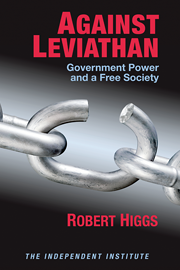OAKLAND, Calif.—The health care legislation recently bulldozed through Congress is only the tip of the iceberg. With some 2,400 pages of dense legalese—with thousands of additional pages of regulations implementing the legislation still to be written—this huge statute puts government in effective control of some of life’s most intimate, personal, and important decisions: who will receive medical care, and when, where, and how it will be received.
A popular slogan of the Italian Fascists under Mussolini was, “Tutto nello Stato, niente al di fuori dello Stato, nulla contro lo Stato”—meaning, “Everything for the state, nothing outside the state, nothing against the state.”
I recall this expression frequently as I observe the government’s growing reach in American society. Washington’s medical-care power grab is only the latest example.
What of any consequence remains beyond the state’s reach in the United States today? Not wages, working conditions, or labor management relations; not health care; not money, banking, or financial services; not personal privacy; not transportation or communication; not education or scientific research; not farming or food supply; not nutrition or food quality; not marriage or divorce; not child care; not provision for retirement; not recreation; not insurance of any kind; not smoking or drinking; not gambling; not political campaign funding or publicity; not real-estate development, home construction, or housing finance; not international travel, trade, or finance; not 1,000 other areas and aspects of economic and social life.
Some believe that the state still keeps its hands off religion, but even that’s not true. It certifies certain religious organizations as legitimate and condemns others, as many young men discovered to their sorrow when they attempted to claim “conscientious objector” status during the Vietnam War. It assigns members of certain religions, but not members of others, as chaplains in the armed services. It even grants clergy certain privileges not available to others.
Indeed, statism itself has become a religion for many Americans. Do they not honor the government above all else, even above the commandments of the religions they claim to embrace?
Whenever modern Americans encounter a problem, they look to government for their salvation, just as their ancestors, before the 20th century, looked to divine providence.
When the government makes a mess of things, eliciting complaints and protests, as it has for example in every area related to health care, it responds by making “reforms” that heap new laws, regulations, and government bureaus atop the existing mountain of counterproductive laws, regulations, and government bureaus. Thus, each new “reform” makes the government larger and more destructive than before.
The areas of life that remain outside the government’s participation, regulation, surveillance, or manipulation by means of taxes and subsidies have become so few and so trivial they scarcely merit mention.
We verge ever closer on the condition in which everything that is not prohibited is required. Yet the average American will declare loudly that he is a free man and that the United States is the freest country in the world.
As the state seeks to control virtually everything and crushes all real opposition, Americans now inhabit a country that would be completely unrecognizable to its founders. Indeed, it bears only faint resemblance to the country it was just 50 years ago.
More and more, “Land of the Free” is becoming nothing but an empty, pathetic boast.



















